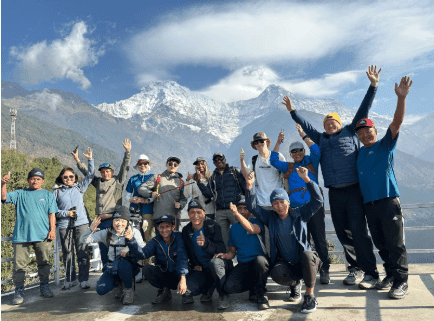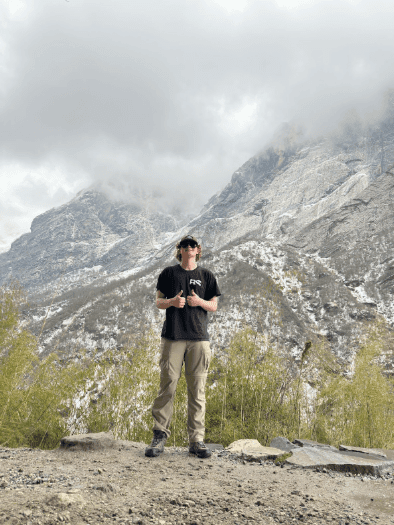Jonathan Marquart, an MSU freshman, conquers the Nepalese Mountains to Fundraise for a Cancer Hospital

Author
Binaytara Team

Jonathan Marquart, Freshman at Montana State University
A Spring Break Rooted in Global Health and Purpose
On March 10th, 2025, while many college students were planning their spring break to unwind and recharge, Montana State University freshman Jonathan Marquart embarked on an adventurous journey to Nepal with the desire to make a difference. His break was not typical; he trekked the hilly terrain of Nepal, observing how health disparities impact the people living there.
Jonathan was part of a group organized by the Binaytara, a global oncology nonprofit founded by Dr. Binay Shah. The organization is working to expand access to cancer care in South Asia by building cancer hospitals and training local healthcare providers. The purpose of the trip was two-fold: to complete a challenging trek to Annapurna Base Camp and to raise awareness and support for a state-of-the-art 200-bed cancer hospital in Janakpur, Nepal, which will be the first and only dedicated cancer center in Province 2, home to over 6 million people.
Trekking Annapurna: Fundraising for Cancer Care in Nepal
“It was the farthest I have ever been from home,” Jonathan said. “The only other country I’d been to was Canada. Going to Nepal, somewhere culturally different and remote in some ways, was a big leap. But I wanted to push myself and see the world from a new perspective.”
Alongside 12 trekkers, Jonathan began his journey in Pokhara, a vibrant lakeside city nestled at the base of the Annapurna mountain range. Over several days, they trekked through terraced farmlands, rhododendron forests, and alpine valleys. Each step brought him closer to the Annapurna Base Camp, a scenic viewpoint over 13,500 feet above sea level. It offers panoramic views of some of the world’s highest peaks.
Reflecting on his journey, Jonathan remarked, “The trek itself was tough. Some days we were climbing stairs for hours. The elevation hit a few people pretty hard. But every time we stopped for a break, you would look around and realize just how beautiful and humbling it was. The mountains do not look real. They were so massive, so ancient.”
Reflections on Culture, Resilience, and Global Oncology
Jonathan said that bonding with the group, which included healthcare professionals, cancer survivors, students, and volunteers from across the U.S., was one of the most meaningful parts of the experience. “Dinner time in the tea houses was my favorite,” he said. “We would all be exhausted, gathered around a wood stove, eating ‘dal bhat’ and sharing stories. That is where we really got to know each other. I especially connected with another college student named Daniel. We were the youngest in the group, and it was cool to have someone to relate to.”
Another highlight for Jonathan was learning from the local guides and porters who accompanied them on the trek. The porters, many of whom carried over 50 pounds of gear up the steep mountain paths, left a lasting impression.
“They were absolutely incredible,” he said. “Just unbelievably strong and resilient. Some of them did the whole trek in flip-flops or worn-out shoes. It gave me a whole new respect for the people who make tourism in Nepal possible.”
The group was led by Laxman, a seasoned Nepali guide who Jonathan described as "funny, wise, and incredibly patient." Laxman taught the group basic Nepali phrases and explained local customs along the way.
Firsthand Exposure to Cancer Screenings and Health Disparities
After completing the trek, Jonathan and the rest of the team flew to Janakpur, a city in southern Nepal, where the Binaytara is building the region’s first comprehensive cancer hospital. Located near the Indian border, Janakpur is an area underserved by Nepal’s healthcare system, with many residents traveling several hours, or even across the border, to receive basic medical care.
On March 23rd, Jonathan participated in the organization’s free health camp, which provided medical checkups, prescriptions, and cancer screenings to hundreds of people in the community. For Jonathan, this was an eye-opening experience, he said
“That part really struck me. People were lining up all day long, just hoping to see a doctor or get some medicine. Many of them had never had a check-up before. You realize how basic care the things we take for granted in the U.S. can be life-changing for someone in a place like Janakpur.”
A Glimpse into the Future of Cancer Care in Janakpur
Though Jonathan was not able to visit the new hospital site in person, he saw photos and heard stories from the group that stayed with him.
“They showed me pictures of the hospital under construction, a big, modern building. Knowing it is going to serve over 20,000 patients a year, many of whom would otherwise have no access to cancer treatment, was really powerful,” he said. “It made the whole trip feel even more meaningful.”
Jonathan also reflected on how different Janakpur felt from the more tourist-friendly areas like Pokhara or Kathmandu.
“Janakpur was where I really saw the rural side of Nepal,” he said. “It was surrounded by farmland and small villages. You can tell a lot of people there have not traveled far. As a tall American guy, I stood out. People would stare or try to talk to me in Hindi or Nepali. It was humbling and also a little surreal.”
A Lifelong Commitment to Cancer Equity and Global Health
The experience challenged Jonathan in ways he did not expect, from dealing with travel logistics to adapting to a new culture. He says it is a trip he would recommend to anyone.
“If you are a student thinking about going abroad. Just go,” he said. “It will push you out of your comfort zone, and you will grow so much. You will see things differently. You will appreciate what you have. And you will come back with stories and memories that you will carry for the rest of your life.” He paused, then added with a grin, “Also, definitely pack antibiotics and Pepto Bismol.”
Back in Bozeman, Jonathan is sharing his experiences with classmates and professors and hopes his story will encourage more students to consider educational travel and service-learning abroad. He is also continuing to follow the Binaytara’s progress in Janakpur and says he would love to return one day when the cancer hospital is fully operational.
“I feel like I got a small glimpse of a bigger picture,” he said. “And now I want to keep learning, keep helping however I can. Whether it is in Nepal or here at home—global health is something we all have a stake in.”